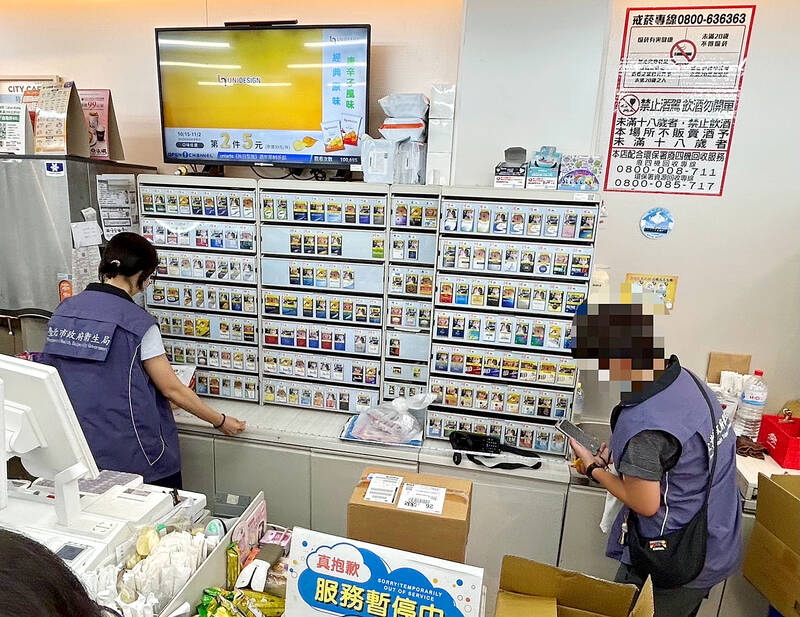The first legally approved heated tobacco products were on Friday removed from shelves shortly after they were released on the same day, as inspectors found that product packages did not mark their nicotine content.
The Ministry of Health and Welfare’s Health Promotion Administration (HPA) in late July announced that it conditionally approved 14 heated tobacco products from two tobacco companies.
Eight types of products from one company went on sale on Friday, but inspectors on the same day found that those on shelf failed to meet the requirements, and they ordered products to be removed from shelves.

Photo courtesy of the Taipei Department of Health
Minister of Health and Welfare Shih Chung-liang (石崇良) oversaw unannounced inspections in convenient stores in Taipei.
Shih yesterday said that many inspections took place across the country on Friday.
Shih said that the first convenience store he checked was out of such products, so the inspectors could only checked whether the products’ display and advertisement followed to the standards.
However, inspectors in other administrative regions reported that some products did not specify nicotine content on their package, so the ministry ordered the removal of all products from shelves until their packages are reviewed again and meet the standards, he said.
The company manufacturing mislabeled products had sent package samples for review when applying for approval, and those specified the amount of nicotine, he said, adding that the problem might have occurred during the mass production or shipment processes, but the company would be held accountable.
“We have first ordered it to remove all its products from shelves, because they do not comply with the standards, and then, we would clarify its responsibilities,” he said.
At the same time, the ministry would also examine the nicotine content of the products to see if they meet the regulations, Shih said.
Heated tobacco products, unlike cigarettes, do not produce tar when burned, so the main health risk is nicotine-related, and the legal standard is no more than 1mg of nicotine per stick, he said.
If the lab examination shows that the nicotine content complied with the standard, then the company would only be at fault for mislabeling, he said.
The results are expected to be available next week, Shih added.
The HPA said that the mandatory labeling of tar and nicotine on containers of tobacco products is based on Regulations for the Testing Nicotine and Tar Content in Tobacco Products and the Labeling of Tobacco Product Containers (菸品尼古丁焦油含量檢測及容器標示辦法).
If heated tobacco products fail to specify their nicotine content on the package, the manufacturer or importer faces a fine up to NT$5 million (US$162,941), it said.
The Taipei Department of Health said that as of 7pm on Friday, the joint inspection by the ministry, the HPA and the department had inspected 115 retailers and found five heated tobacco products that failed to mark their nicotine content, so the importer would be fined NT$1 million to NT$5 million, and the retailers NT$10,000 to NT$50,000 each.
The HPA and the Taipei department also said that heated tobacco products cannot be sold to people younger than 20 years and pregnant women, adding that the government holds a “zero tolerance” stance on such products’ sale to adolescents.
The city government said it banned retailers within 50m from high schools and elementary schools from selling such products.
Additional reporting by Sun Wei-jung

A drunk woman was sexually assaulted inside a crowded concourse of Taipei Railway Station on Thursday last week before a foreign tourist notified police, leading to calls for better education on bystander intervention and review of security infrastructure. The man, surnamed Chiu (邱), was taken into custody on charges of sexual assault, taking advantage of the woman’s condition and public indecency. Police discovered that Chiu was a fugitive with prior convictions for vehicle theft. He has been taken into custody and is to complete his unserved six-month sentence, police said. On Thursday last week, Chiu was seen wearing a white

EVA Airways, one of the leading international carriers in Taiwan, yesterday said that it was investigating reports that a cabin crew manager had ignored the condition of a sick flight attendant, who died on Saturday. The airline made the statement in response to a post circulating on social media that said that the flight attendant on an outbound flight was feeling sick and notified the cabin crew manager. Although the flight attendant grew increasingly ill on the return flight, the manager did not contact Medlink — a system that connects the aircraft to doctors on the ground for treatment advice during medical

The Taoyuan Flight Attendants’ Union yesterday vowed to protest at the EVA Air Marathon on Sunday next week should EVA Airway Corp’s management continue to ignore the union’s petition to change rules on employees’ leave of absence system, after a flight attendant reportedly died after working on a long-haul flight while ill. The case has generated public discussion over whether taking personal or sick leave should affect a worker’s performance review. Several union members yesterday protested at the Legislative Yuan, holding white flowers and placards, while shouting: “Life is priceless; requesting leave is not a crime.” “The union is scheduled to meet with

‘UNITED FRONT’ RHETORIC: China’s TAO also plans to hold weekly, instead of biweekly, news conferences because it wants to control the cross-strait discourse, an expert said China’s plan to expand its single-entry visa-on-arrival service to Taiwanese would be of limited interest to Taiwanese and is a feeble attempt by Chinese administrators to demonstrate that they are doing something, the Mainland Affairs Council said yesterday. China’s Taiwan Affairs Office (TAO) spokesman Chen Binhua (陳斌華) said the program aims to facilitate travel to China for Taiwanese compatriots, regardless of whether they are arriving via direct flights or are entering mainland China through Hong Kong, Macau or other countries, and they would be able to apply for a single-entry visa-on-arrival at all eligible entry points in China. The policy aims